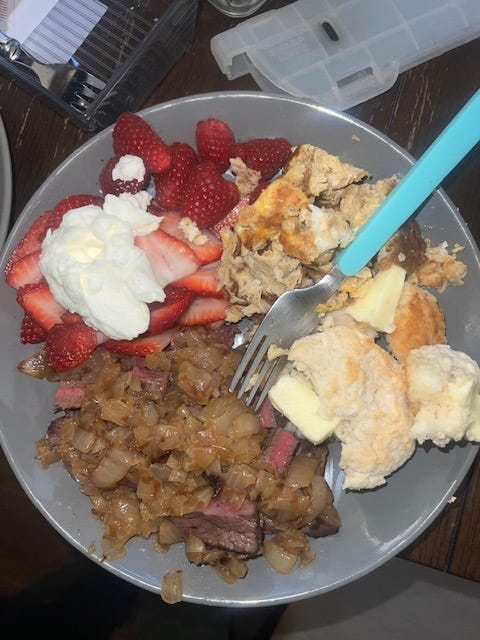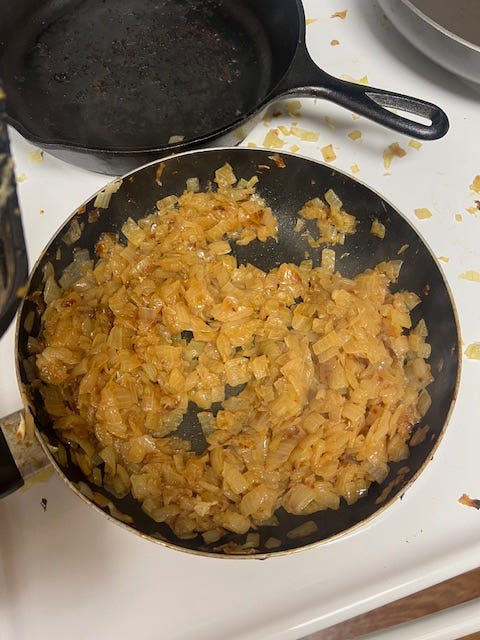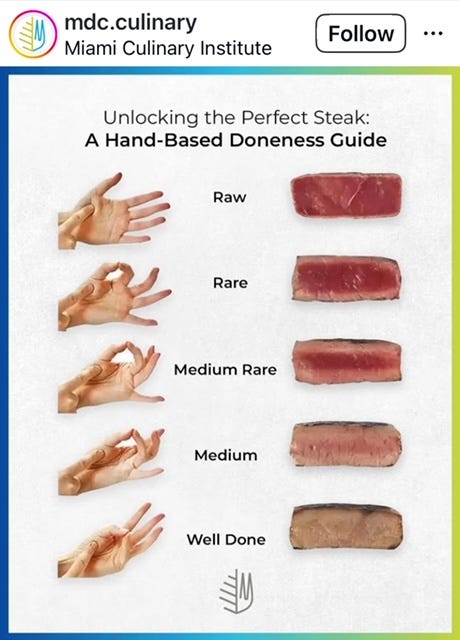My oldest son is finishing his last semester at Grand Canyon University and works across town. Often on his commute he calls and we talk about food. It’s mostly specific questions and I love it!
A couple weeks ago we chatted about the importance of buying locally raised pork, the differences between store bought, health benefits and how the industrialized system is broken.
When we lived in Little Rock, I worked closely with a handful of farmers. They used my driveway for drop offs as well as connections with like-minded consumers. I worked to educate my friends about food being medicine; I never thought I would be having these conversations with my adult children!!
Yesterday on his drive back to campus he asked how to caramelize onions. As well as a refresher on cooking steak. He had plans to make an amazing breakfast for his bros.


The Steak
I admitted to him that I’m no expert when it comes to steak, and that YouTube may provide better guidance. I don’t cook steaks frequently simply because of the cost of feeding a family.
He has a cast iron skillet. I recommended preheating the skillet to screaming hot then searing both sides, a couple minutes on each side, then finishing in a 350* oven until he finishes eggs on the stovetop.
Without a thermometer, I told him about the below method of determining how done a steak will be.
Onions
I frequently caramelize onions. Does this make me an expert? Ha!
Often I’ll slice or chop an onion then get it going on the stovetop whilst I putter and find something else to add to dinner.
Onions are inexpensive, good source of sulfur especially during cold/flu season and keep forever.
Flavonoids, also known as sulfur compounds, may protect against cancer and are the real star.
Sulfur is the third most abundant element in your body. The body needs sulfur to build and repair DNA + protect cells from damage. Sulfur also assists the body to metabolize food and contributes to the health of your skin, tendons, and ligaments. If you don't like onions, take an epsom salt bath regularly. The chemical name for epsom salt is magnesium SULFATE.
Sulfur is found in three supplements frequently used to relieve joint pain and inflammation: glucosamine sulfate, chondroitin sulfate, and methylsulfonylmethane. Some natural health practitioners believe these may also improve the quality of skin, fingernails, and other tissues.
In the gut, onions are among the main dietary sources of fructans also known as prebiotic fibers. (Reminder: prebiotics feed the probiotics.) More about the life-changing magic of onions in an article I wrote here.
How to Caramelize Onions
I start with a cold pan and add a knob of butter to melt while chopping the onion. Once the onion is in the pan, ALWAYS ADD SALT.
Adding salt early helps to pull out water - that’s what you want to intensify the sweet flavor.
Heat can be higher to cook faster (maybe 5 on scale of 10) but you will have to stir more frequently, possibly add more fat especially if the onions begin to stick to the pan. I’ve seen some people add a splash of water, instead of more butter, as time goes on.
I start them higher then low and slow to finish…especially if I need to walk away from the stovetop for ten or more minutes.
I’ve seen where some people will slice several pounds and put them in a slow cooker all day to caramelize.
Factors for How Long It Takes
He said it took over an hour and wasn’t really sure when to stop.


We were texting at this point.
I said: They look great and maybe could have gone longer in the pan. It looks like a lot in the pan. So a smaller amount of onions would have cooked faster, or more surface area with a larger pan. (We’d discussed the day before that the size of the onion pieces also influences how long it takes.)
I would probably turn the heat up higher in the beginning to cook off the water. Also be sure to salt the first thing to help pull off water - which concentrates flavor.
Too far and it begins to burn. Caramelized onions can get really dark (and I sent the google search image for reference.)
He said: Oh I did turn it up in the beginning but I forgot to salt. I knew to do that but forgot. There was a lot going on so I king of threw them in there and did other things.
I said: You’re doing great! I can relate to the “a lot going on…” I’m sure they were yummy. So proud of you for jumping in there. You’re being an adventurous cook…
He said: Will certainly try again.
I Love Hearing from Readers
Anna wrote in response to my inordinate excitement about this meal:
I had cod in my freezer and I kept putting off using it and this was the perfect way to use it (easily!). I had the ingredients on hand for the most part and it was delish. I had some homemade corn tortillas and made tacos!
Erin told me she cooked hamburgers in the oven and loved that it was minimal clean up!
I hope you, dear reader, will caramelize onions soon!
Life is hard; food doesn’t have to be.
Julie
PS - If you’re in Louisville, I announced a flash sale on local, grass-finished beef.






I carmelized vidalia onions (More than I could eat) about 10 days ago because of you. 😁 They were delicious!
Then I went on a fast and could not would not throw them out and there were a lot. So, I froze them in an ice cube tray and popped them in a freezer bag. I can unthaw them and even use them in other dishes if nothing else. (I actually had thrown some in a soup I made and it tasted richer than normal. )